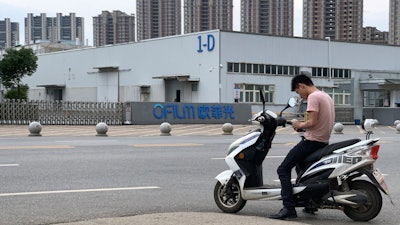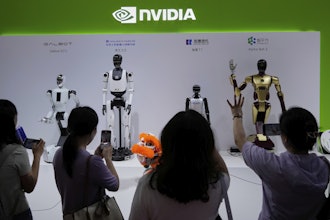
NANCHANG, China (AP) — In a lively Muslim quarter of Nanchang city, a sprawling Chinese factory turns out computer screens, cameras and fingerprint scanners for a supplier to international tech giants such as Apple and Lenovo. Throughout the neighborhood, women in headscarves stroll through the streets, and Arabic signs advertise halal supermarkets and noodle shops.
Yet the mostly Muslim ethnic Uighurs who labor in the factory are isolated within a walled compound that is fortified with security cameras and guards at the entrance. Their forays out are limited to rare chaperoned trips, they are not allowed to worship or cover their heads, and they must attend special classes in the evenings, according to former and current workers and shopkeepers in the area.
The connection between OFILM, the supplier that owns the Nanchang factory, and the tech giants is the latest sign that companies outside China are benefiting from coercive labor practices imposed on the Uighurs, a Turkic ethnic group, and other minorities.
Over the past four years, the Chinese government has detained more than a million people from the far west Xinjiang region, most of them Uighurs, in internment camps and prisons where they go through forced ideological and behavioral re-education. China has long suspected the Uighurs of harboring separatist tendencies because of their distinct culture, language and religion.
When detainees “graduate” from the camps, documents show, many are sent to work in factories. A dozen Uighurs and Kazakhs told the AP they knew people who were sent by the state to work in factories in China’s east, known as inner China — some from the camps, some plucked from their families, some from vocational schools. Most were sent by force, although in a few cases it wasn’t clear if they consented.
Workers are often enrolled in classes where state-sponsored teachers give lessons in Mandarin, China’s dominant language, or politics and “ethnic unity.” Conditions in the jobs vary in terms of pay and restrictions.
At the OFILM factory, Uighurs are paid the same as other workers but otherwise treated differently, according to residents of the neighborhood. They are not allowed to leave or pray – unlike the Hui Muslim migrants also working there, who are considered less of a threat by the Chinese government.
“They don’t let them worship inside,” said a Hui Muslim woman who worked in the factory for several weeks alongside the Uighurs. “They don’t let them come out.”
"If you’re Uighur, you’re only allowed outside twice a month,” a small business owner who spoke with the workers confirmed. The AP is not disclosing the names of those interviewed near the factory out of concern for possible retribution. “The government chose them to come to OFILM, they didn’t choose it.”
The Chinese government says the labor program is a way to train Uighurs and other minorities and give them jobs. The Chinese Ministry of Foreign Affairs on Monday called concern over possible coerced labor under the program “groundless” and “slander.”
However, experts say that like the internment camps, the program is part of a broader assault on the Uighur culture, breaking up social and family links by sending people far from their homes to be assimilated into the dominant Han Chinese culture.
“They think these people are poorly educated, isolated, backwards, can’t speak Mandarin,” said James Leibold, a scholar of Chinese ethnic policy at La Trobe University in Melbourne. “So what do you do? You ‘educate’ them, you find ways to transform them in your own image. Bringing them into the Han Chinese heartland is a way to turbocharge this transformation.”
OFILM’s website indicates the Xinjiang workers make screens, camera cover lenses and fingerprint scanners. It touts customers including Apple, Samsung, Lenovo, Dell, HP, LG and Huawei, although there was no way for the AP to track specific products to specific companies.
Apple’s most recent list of suppliers, published January last year, includes three OFILM factories in Nanchang. It’s unclear whether the specific OFILM factory the AP visited twice in Nanchang supplies Apple, but it has the same address as one listed. Another OFILM factory is located about half a mile away on a different street. Apple did not answer repeated requests for clarification on which factory it uses.
In an email, Apple said its code of conduct requires suppliers to “provide channels that encourage employees to voice concerns.” It said it interviews the employees of suppliers during annual assessments in their local language without their managers present, and had done 44,000 interviews in 2018.
Lenovo confirmed that it sources screens, cameras, and fingerprint scanners from OFILM but said it was not aware of the allegations and would investigate. Lenovo also pointed to a 2018 audit by the Reliable Business Alliance in which OFILM scored very well.
All the companies that responded said they required suppliers to follow strict labor standards. LG and Dell said they had “no evidence” of forced labor in their supply chains but would investigate, as did Huawei. HP did not respond.
OFILM also lists as customers dozens of companies within China, as well as international companies it calls “partners” without specifying what product it offers. And it supplies PAR Technology, an American sales systems vendor to which it most recently shipped 48 cartons of touch screens in February, according to U.S. customs data obtained through ImportGenius and Panjiva, which track shipping data.
PAR Technology in turn says it supplies terminals to major chains such as McDonald’s, Taco Bell, and Subway. However, the AP was unable to confirm that products from OFILM end up with the fast food companies.
McDonald’s said it has asked PAR Technology to discontinue purchases from OFILM while it launches an immediate investigation. PAR Technology also said it would investigate immediately. Subway and Taco Bell did not respond.
A report Sunday from the Australian Strategic Policy Institute, researched separately from the AP, estimated that more than 80,000 Uighurs were transferred from Xinjiang to factories across China between 2017 and 2019. The report said it found “conditions that strongly suggest forced labor” consistent with International Labor Organization definitions.
The AP also reported a year ago that Uighur forced labor was being used within Xinjiang to make sportswear that ended up in the U.S.
Farmers to Factory Workers
Beijing first sent Uighurs to work in inland China in the early 2000s, as part of a broad effort to push minorities to adopt urban lifestyles and integrate with the Han Chinese majority to tighten political control.
At first the program targeted young, single women, because the state worried that Uighur women raised in pious Muslim families didn’t work, had children early and refused to marry Han men. But as stories of poor pay and tight restrictions trickled back, police began threatening some parents with jail time if they didn’t send their children, six Uighurs told the AP.
The program was halted in 2009, when at least two Uighurs died in a brawl with Han workers at a toy factory in coastal Guangdong province. After peaceful protests in Xinjiang were met with police fire, ethnic riots broke out that killed an estimated 200 people, mostly Han Chinese civilians.
An AP review of Chinese academic papers and state media reports shows that officials blamed the failure of the labor program on the Uighurs’ language and culture. So when the government ramped up the program again after the ascent of hardline Chinese President Xi Jinping in 2012, it emphasized ideological transformation.
A paper drafted by the head of the Xinjiang statistics bureau in 2014 said the Uighurs’ poor Mandarin made it hard for them to integrate in inner China. It concluded that Xinjiang’s rural minorities needed to be broken away from traditional lifestyles and systematically “disciplined”, “trained” and “instilled with modern values.”
“The local saturated religious atmosphere and the long-time living habits of ethnic minorities are incompatible with the requirements of modern industrial production,” the paper said. It outlined a need to “slowly correct misunderstandings about going out to choose jobs.”
Before Uighurs were transferred for jobs, the paper continued, they needed to be trained and assessed on their living habits and adoption of corporate culture.
“Those who fail will not be exported,” it said.
The paper also described government incentives such as tax breaks and subsidies for Chinese companies to take Uighurs. A 2014 draft contract for Xinjiang laborers in Guangdong province obtained by the AP shows the government there offered companies 3000 RMB ($428.52) per worker, with an additional 1000 RMB ($142.84) for “training” each person for no less than 60 class hours. In exchange, companies had to offer “concentrated accommodation areas,” halal canteens and “ethnic unity education and training.”
But it was a tough sell at a time when Chinese officials were grappling with knifings, bombings and car attacks by Uighurs, fueled by explosive anger at the government’s harsh security measures and religious restrictions. Hundreds died in race-related violence in Xinjiang, both Uighur and Han Chinese.
A labor agent who only gave his surname, Zhang, said he tried brokering deals to send Xinjiang workers to factories in the eastern city of Hangzhou, but finding companies willing to take Uighurs was a challenge, especially in a slowing economy.
"Their work efficiency is not high," he said.
The size of the program is considerable. A November 2017 state media report said Hotan prefecture alone planned to send 20,000 people over two years to work in inner China.
There, the report said, they would “realize the dreams of their lives.”
Government's Call
The Uighurs at OFLIM were sent there as part of the government’s labor program, in an arrangement the company’s website calls a “school-enterprise cooperative.” OFILM describes the workers as migrants organized by the government or vocational school students on “internships”.
OFILM confirmed it received AP requests for comment but did not reply.
The AP was unable to get inside the facility, and on one visit to Nanchang, plainclothes police tailed AP journalists by car and on foot. But posts on the company website extoll OFILM’s efforts to accommodate their Uighur workers with Mandarin and politics classes six days a week, along with halal food.
OFILM first hired Uighurs in 2017, recruiting over 3,000 young men and women in Xinjiang. They bring the Uighurs on one- or two-year contracts to Nanchang, a southeastern metropolis nearly two thousand miles from Xinjiang that local officials hope to turn into a tech hub.
OFILM is one of Nanchang’s biggest employers, with half a dozen factory complexes sprinkled across the city and close ties with the state. Investment funds backed by the Nanchang city government own large stakes in OFILM, corporate filings show. The Nanchang government told the AP that OFILM recruits minorities according to “voluntary selection by both parties" and provides equal pay along with personal and religious freedom.
OFILM’s website says the company “answered the government’s call” and went to Xinjiang to recruit minorities. The Uighurs need training, OFILM says, to pull them from poverty and help them “study and improve.”
Mandarin is heavily emphasized, the site says, as well as lessons in history and “ethnic unity” to “comprehensively improve their overall quality.” The site features pictures of Uighurs playing basketball on factory grounds, dancing in a canteen and vying in a Mandarin speech competition.
In August, when OFILM organized celebrations for Eid Qurban, a major Islamic festival, Uighur employees did not pray at a mosque. Instead, they dressed in orange uniforms and gathered in a basketball court for a show with Communist officials called “Love the Motherland – Thank the Party.” An OFILM post said a “Uighur beauty” dazzled with her “beautiful exotic style.”
State media reports portray the Nanchang factory workers as rural and backwards before the Communist Party trained them, a common perception of the Uighurs among the Han Chinese.
“The workers’ concept of time was hazy, they would sleep in till whenever they wanted,” a Party official is quoted as saying in one. Now, he said, their “concept of time has undergone a total reversal.”
In the reports and OFILM posts, the Uighurs are portrayed as grateful to the Communist Party for sending them to inner China.
Despite the wan expressions of three OFILM workers from Lop County, a December 2017 report said they gave an “enthusiastic” presentation about how they lived in clean new dormitories “much better than home” and were visited by Communist Party cadres.
“We were overjoyed that leaders from the Lop County government still come to see us on holidays,” one of the workers, Estullah Ali, was quoted as saying. “Many of us were moved to tears.”
They Took My Child
Minorities fleeing China describe a far grimmer situation. H., a wealthy jade merchant from Lop County, where OFILM now gets Uighur workers, began noticing the labor transfer program in 2014. That’s when state propaganda blaring through television and loudspeakers urged young Uighurs to work in inner China. Officials hustled families to a labor transfer office where they were forced to sign contracts, under threat of land confiscations and prison sentences.
H., identified only by the initial of his last name out of fear of retribution, was worried. The government was not only reviving the labor program but also clamping down on religion. Acquaintances vanished: Devout Muslims and language teachers, men with beards, women with headscarves.
Toward the end of 2015, when H. greeted his 72-year-old neighbor on the street, the man burst into tears.
“They took my child to inner China to work,” he said.
Months later, H. and his family fled China.
Zharqynbek Otan, a Chinese-born ethnic Kazakh, said that after he was released from an internment camp in 2018, neighbors in his home village also told him their sons and daughters were forced to sign contracts for 6 months to five years to work at factories near Shanghai. If they ran from the factories, they were warned, they’d be taken straight back to internment camps.
Nurlan Kokteubai, an ethnic Kazakh, said during his time in an internment camp, a cadre told him they selected young, strong people to work in inner Chinese factories in need of labor.
“He told us that those young people would acquire vocational skills,” Kokteubai said.
Not all workers are subject to the restrictions at OFILM. One ethnic Kazakh said her brother made power banks in central China for $571.36 a month and didn’t take classes.
But another said two of his cousins were forced to go and work in cold, harsh conditions. They were promised $428.52 a month but paid only $42.85. Though they wanted to quit, four Uighurs who complained were detained in camps after returning to Xinjiang, scaring others.
Uighurs and Kazakhs in exile say it’s likely those working in inner China are still better off than those in camps or factories in Xinjiang, and that in the past, some had gone voluntarily to earn money. A former worker at Jiangxi Lianchuang Electronics, a lens maker in Nanchang, told The Associated Press the 300 or so Uighurs there were free to enter or leave their compound, although most live in dormitories inside factory grounds. He and a current worker said they were happy with their working conditions, their salary of about 5,000 RMB ($714.20) a month, and their teachers and Mandarin classes in the evenings.
But when presented a list of questions in Uighur about the labor transfers, the former Jiangxi Lianchuang worker started to look very nervous. He asked for the list, then set it on fire with a lighter and dropped it in an ashtray.
“If the Communist Party hears this, then” – he knocked his wrists together, mimicking a suspect being handcuffed. “It’s very bad.”






















